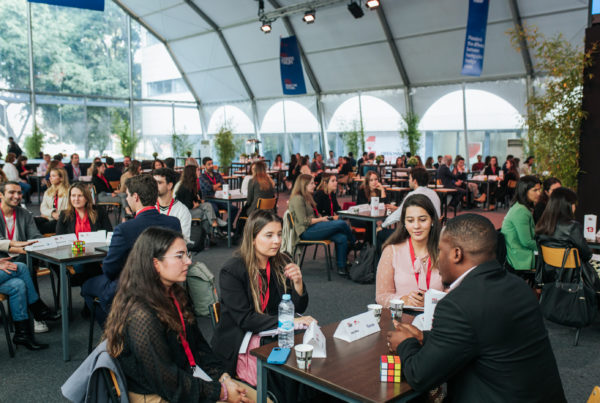Event organizers have been faced with a lot of questions regarding the establishment of safety and public health measures for hosting local events during the crisis of COVID-19. Let’s check the rules announced by the portuguese government.
In this blog post we seek to gather the main guidelines announced in Diário da República, dispatch 7900-A/2020 (August, 12) which “sets the interpretation of the principles and guidelines applicable to the holding of corporate events”.
It presents the rules to be applied across all corporate events, as well as the specific rules (but cumulatively applicable) for the different types of corporate events.
By the said order, corporate events are described as “meetings, congresses, exhibitions and trade or craft fairs, seminars, conferences or similar events, organized by public or private entities, intended for the organization members or employees or open to the public or to others”.
For corporate events, the rules envisaged involve 4 principal measures:
(1) A contingency plan for COVID-19 (for each outdoor space or enclosure) and the (2) implementation of access and movement measures:
- Obligation to the definition of specific circuits for entering and leaving spaces (using separate doors or entrances);
- Ensure that people remain at the event only for the time necessary for it;
- Promote the containment, as much as possible, of the touch on products or equipment (for example, the advance purchase of tickets via electronic and payments via contactless should be privileged).
(3) A plan for cleaning and sanitizing the different spaces of the event, that must ensure:
- The provision of skin disinfectant solutions, for the staff and participants, that must be available in all entrances and exits of spaces and enclosures, as well as indoor spaces, in suitable locations for disinfection”;
- The periodic cleaning and disinfection of spaces, equipment, objects and surfaces, in which there is intense contact”;
- The cleaning and disinfection of the equipment, before and after each use or participant interaction, such as objects, surfaces, products and other utensils”;
- Service stations or stands should preferably be equipped with protection barriers”;
- Whenever applicable, the maintenance of ventilation systems must be ensured, assuring that their operation is carried out without the occurrence of air re-circulation”;
- The control of public accesses, in compliance with the provisions of the previous numbers;
- The refusals monitoring of public access, in order to avoid, as much as possible, the concentration of people at the entrance of spaces or venues.
(4) The use of a mask or visor is mandatory for all staff members, participants or third parties whenever they’re in closed spaces, except when they’re speaking or eating food;
Cumulative rules for different types of corporate events are also specified to complement the guidelines and principles described above.
In the case of exhibitions and trade fairs, access control mechanisms must also be guaranteed and the organizers must enforce the “maximum occupancy rule of 0.05 people per square meter of area, excluding organizers and other staff assigned to the organization.”.
Social distance must also be ensured, namely, in the waiting lines or in public concentration areas, respecting “a minimum distance of two meters between people”.
For “conferences, seminars, talks or similar, held in places with the characteristics of an auditorium, concert hall, amphitheater, congress hall or similar”, it must be announced specific rules for space distribution.
- “The occupancy of the seating places must be carried out with spacing between people who are not cohabiting, with the previous and next row being occupied by different seats”. In the case of events with a stage, it’s necessary to guarantee the minimum distance of two meters between the stage and the front row of the audience. Likewise, those present on stage must respect the distance between them.
If those conferences, seminars, talks or similar were held outdoor it’s recommended to plan seating in the enclosure, and if possible with proper identification. The distance between spectators must respect the rule of five feet. Also for this type of event, whenever there’s a stage area, it’s necessary to ensure a minimum distance of two meters between the stage and the front row of the audience.
In events held in outdoor venues, visitors should preferably be seated. Other corporate events held in outdoor or indoor venues:
- For each outdoor or indoor venue, there must be a contingency plan for COVID-19, which must contain an operational procedure on the actions to be taken in case of infection, symptoms or contact with a confirmed case of COVID -19 ;
- Access and circulation measures related to access accross the spaces or venues of the events must be implemented, in order to avoid an excessive concentration of people, either inside or at their entrance;
- A plan for cleaning and sanitizing the venues and spaces of the events must be outlined.
Corporate events held in other types of locations must be preceded by a risk assessment by the local health authorities to determine the viability and conditions for their performance.
It should also be noticed that, when it comes to “areas of consumption of beverages and food integrated in the scope of corporate events”, the following rules must be followed:
- The maximum occupancy rule of 10 people per table must be respected;
- All rules and instructions defined by DGS for the catering sector must also be respected.
Finally, and regarding the opening hours of establishments (Order No. 8998-D / 2020, regarding the contingency situation in the entire continental national territory, with effect since 00:00 of the 15th of September, 2020), we highlight the following rules:
- As long as there is no deliberation on the part of each County to restrict the closing hours, establishments can maintain the closing time they have been practicing, that is, until 23:00;
- In the counties where a restrictive schedule has already been set, that will be the limitation to be respected, as long as it falls within the interval between 20:00 and 23:00;
- On the other hand, establishments similar to catering establishments, namely cafes and pastry shops, may close until 01:00, and cannot accept new admissions after 00:00;
- Restaurants and bars located in tourist establishments, namely hotels, in case of service to guests or clients of other services of the enterprises in question, even if they are located in a surrounding radius of 300 meters from an educational establishment, do not the rule that, until 20:00 on working days, groups of no more than four people are not allowed to stay, however, groups of more than 10 people are not allowed to stay in this type of establishment (unless they belong to the same household).
Note: Reading this article should be seen as complementary and does not dispense the reading of the order 7900-A/2020, signed by the Ministry of Economy and Digital Transition, published in Diário da República (DR).








